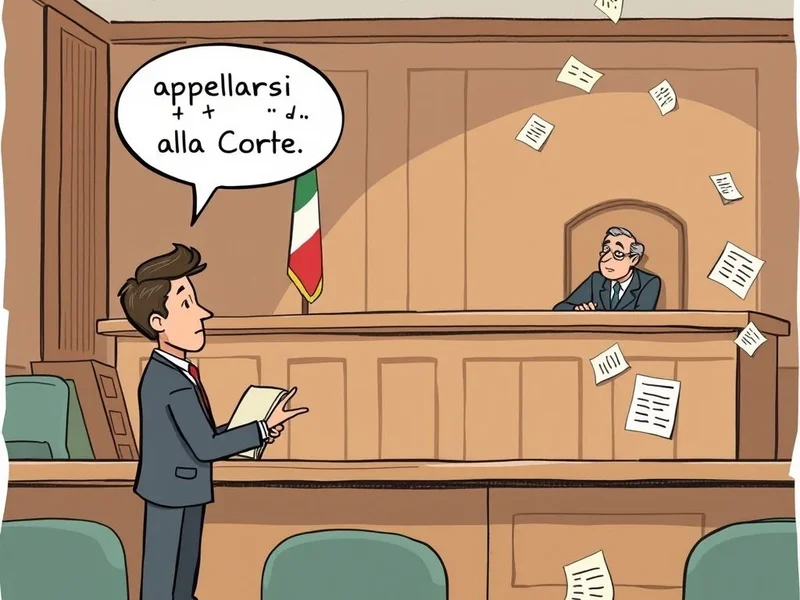How to Use "Appellarsi a": Meaning and Practical Examples
Have you ever wanted to express the idea of "resorting" to something or someone, perhaps to an authority or a moral principle, and didn't know which Italian verb to use? The phrasal verb "appellarsi a" is the answer! It's a key expression in practical Italian vocabulary that lets you communicate more precisely and naturally. In this guide, we'll explore the meaning, grammatical structure, and common uses of "appellarsi a", offering examples with appellarsi a to help you master this expression and enrich your natural speech. You'll not only learn its correct use but also how to avoid the most common mistakes that often confuse students of Italian grammar B1.

Table of Contents
- What does “Appellarsi a” mean?
- The Grammatical Structure: How Is It Used?
- Sentences and examples with “Appellarsi a”
- Crucial Differences: Common Mistakes to Avoid
- Similar or Related Expressions
- Conclusion
More: How to Use Appartenere a Meaning and Practical Examples
What does “Appellarsi a” mean?
- Literal Meaning: To turn to a higher authority (such as a court or an institution) to obtain justice, protection, or a review of a decision.
- Example: "Il condannato ha deciso di appellarsi alla Corte Suprema."
- Figurative Meaning: To invoke or refer to values, principles, feelings (like conscience, solidarity, reason) to gain support, convince someone, or justify an action.
- Example: "Il politico si è appellato al senso civico dei cittadini."
More: Annoiarsi a Meaning and Examples for Natural Italian Use
The Grammatical Structure: How Is It Used?
The verb appellarsi a is a reflexive verb and always requires the preposition "a".
Its general structure is: [Subject] + [Reflexive Pronoun] + appellarsi + a + [Someone/Something]
Conjugation examples:
- Io mi appello a...
- Tu ti appelli a...
- Lui/Lei si appella a...
- Noi ci appelliamo a...
- Voi vi appellate a...
- Loro si appellano a...
The reflexive pronoun is mandatory and agrees with the subject. The preposition "a" introduces what or whom you "appellarsi" to. For example, you can appeal "to the judge", "to the law", "to clemency", "to morality".
More: How to Use Andare a Meaning Uses and Practical Examples
Sentences and examples with “Appellarsi a”
Here are some examples with appellarsi a in real-life contexts to better understand its use:
📍 Context: Court / Legal procedure
Giudice: “La corte ha emesso la sua sentenza.”
Avvocato: “Il mio cliente intende **appellarsi alla** sentenza, ritenendola ingiusta.”
📍 Context: Work meeting / Request for support
Dirigente: “Il progetto è in ritardo e abbiamo bisogno dell'aiuto di tutti.”
Collaboratore: “Dobbiamo **appellarci alla** collaborazione del team per recuperare il tempo perso.”
📍 Context: Conversation between friends / Invoking a principle
Marco: “Non capisco perché non voglia aiutarmi.”
Luca: “Forse dovresti **appellarti alla** sua coscienza, è una brava persona in fondo.”
📍 Context: Public speech / Call to action
Oratore: “La situazione è grave, dobbiamo agire.”
Ascoltatore: “Ha fatto bene a **appellarsi al** buon senso di tutti.”
Crucial Differences: Common Mistakes to Avoid
One of the most common mistakes with "appellarsi a" is omitting the reflexive pronoun or using the wrong preposition.
Appellarsi A (Reflexive + Correct Preposition) Vs. Appellare (Transitive, less common in the sense of appeal)
Correct: Use the reflexive pronoun (
mi,ti,si,ci,vi) and the prepositiona.- Example: "I manifestanti si sono appellati alla decisione del governo." (Meaning: they lodged an appeal against the decision).
Incorrect: Omitting the reflexive pronoun or using another preposition.
- Example 1 (Pronoun omitted): "I manifestanti hanno appellato la decisione del governo." (Grammatically incorrect in this context, "appellare" without a pronoun has other meanings, such as "to name" or "to make an appeal" in specific contexts, as confirmed by Vocabolario Treccani).
- Example 2 (Wrong preposition): "I manifestanti si sono appellati con la decisione del governo." (Preposition error).
Appellarsi A Vs. Ricorrere A
Although very similar and often interchangeable, there is a slight nuance.
- Appellarsi a: Often emphasizes the act of invoking a law, authority, or moral principle, with a more formal or rhetorical sense.
- Example: "Il popolo si è appellato alla Costituzione per difendere i propri diritti."
- Ricorrere a: Has a broader meaning of "making use of" or "resorting to" something/someone as a last resort or means. It can be used in less formal and not necessarily legal/moral contexts.
- Example: "Se non troviamo una soluzione, dovremo ricorrere alla sua esperienza."
Similar or Related Expressions
To further enrich your practical Italian vocabulary, here are some other expressions with similar or related meanings to "appellarsi a":
| Similar Expression | Brief Meaning | Example |
|---|---|---|
| Fare ricorso a | To make use of something/someone, especially in a legal context. | “Hanno deciso di fare ricorso al TAR per il provvedimento.” |
| Invocare | To call for help or strongly refer to something. | “Ha invocato l'aiuto divino in un momento di crisi.” |
| Chiamare in causa | To involve someone in a matter, often legal or a question of responsibility. | “È stato chiamato in causa per i danni subiti.” |
| Richiamarsi a | To refer to a principle, tradition, precedent. | “Il loro discorso si richiamava ai valori della Resistenza.” |
Conclusion
Congratulations! Now you have a better understanding of the verb "appellarsi a", a key expression to communicate in Italian in a more sophisticated and precise way. Keep in mind that it's a reflexive verb and always requires the preposition "a", whether you are appealing to a judge or invoking a principle.
Now it's your turn! Write a sentence in the comments using "appellarsi a" in a context you find useful.